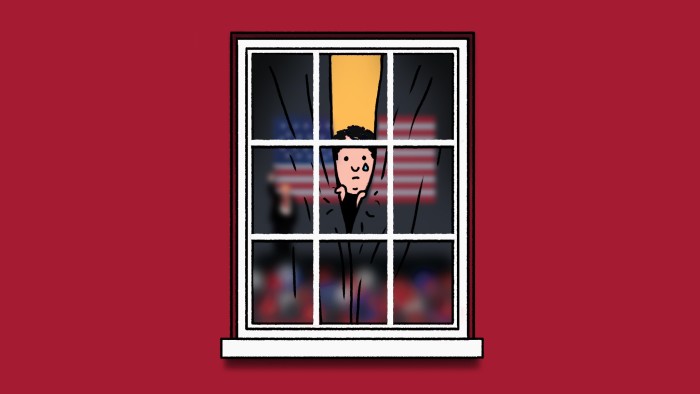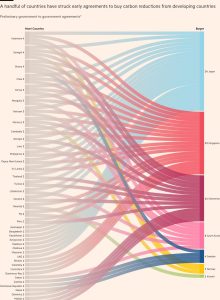Lamentations of a lost liberal

Stay informed with free updates
Simply sign up to the Life & Arts myFT Digest — delivered directly to your inbox.
A liberal friend WhatsApped me after Donald Trump’s victory. “For the first time, my feeling is: I’ll devote myself to my immediate surroundings, my family and friends, and I won’t bother with the rest.” I’m seeing this response now from liberals of both centre-right and left, including myself. Our despair goes beyond Trump. We feel we lost our era, and we have become pointless.
We liberals believed in parliamentary democracy; we trusted facts and what we called “rational” arguments. The fall of the Berlin Wall, when I was 20, inoculated my cohort with optimism. One day in 1994, I had an improbable few minutes alone with the archliberal of the era, Senator Teddy Kennedy, and listened to him marvel about all the countries that were changing for the better. “South Africa,” he said, “but even Bulgaria. Bulgaria!”
I went into journalism that year partly because I wanted to join the analytical apparatus — including academics, assorted wonks and NGOs — that helped guide mighty western governments towards wise policy choices. Back then, global poverty was falling. Racism and sexism seemed so 20th century. A new “international community” would make war obsolete. The rational policymakers who had fixed the ozone layer were going to sort out this new thing called “global warming”.
Even after Trump’s 2016 victory, we liberals stuck to our beliefs. We were baffled but also energised. The Women’s March of January 2017 became the largest single-day protest in US history. Determined to understand Trumpism, we imbibed endless books, podcasts and articles reported from “Trump diners” in Middle America.
Now, after a second, resounding victory, Trumpists are mocking us as out-of-touch elitists who didn’t see it coming. But they’re wrong. Most liberals did see this coming. We have learnt pessimism since 2016. In fact, pessimism is now practically our worldview. This time, we are neither baffled nor energised. We just feel pointless.
The tools and assumptions that we were taught seem not wrong (to us at least) but irrelevant. Journalism has begun to feel like an enjoyable paid hobby which serves no apparent social purpose. Assembling facts and arguments has probably been a waste of a career. British lawyer and writer David Allen Green concludes: “There is no point, in and of itself, showing a candidate to be a liar, fraudster, insurrectionist and/or [arguably] a fascist if people do not actually care if that candidate is a liar, fraudster, insurrectionist and/or a fascist.”
I know that succumbing to nihilism is wrong. We liberals in our comfy enclaves might be fine under Trump, but Ukrainians, poor Americans needing abortions, people living in regions of climate change, etc won’t be. The writer Rebecca Solnit urges: “They want you to feel powerless and to surrender and to let them trample everything and you are not going to let them. You are not giving up, and neither am I. The fact that we cannot save everything does not mean we cannot save anything.” She’s right, but for now I don’t feel it. I just feel shame at the world my generation is bequeathing to our children. Liberal causes have lost. Above all, the biggest unspoken political decision of our time — which predates Trump — is that we won’t take significant action against climate change.
Our chief consolation now is that it’s hard for anyone, even a US president, to act upon the world. The economist Larry Summers once noted that Barack Obama became president and smartphones went mainstream almost simultaneously. Which, he asked rhetorically, changed society more?
Whatever happens next, we’ll just be watching it. The liberal temptation now is to withdraw and enjoy our private pleasures. A despairing message from another liberal friend last week segued into gloating about the revival of his beloved football team.
We liberals can glimpse our possible future in the story of Alexander Kerensky, the leftist parliamentary democrat who became leader of Russia’s provisional government after the revolution of February 1917. He helped introduce universal suffrage, equal rights for women, free speech and other good things. Ousted that November by the Bolshevik revolution, Kerensky fled to the west.
For the rest of his life, he watched a series of catastrophes hit his homeland while he grew comfortably irrelevant. He spent his final decades as a house guest of the wealthy widow Mrs Kenneth F Simpson, living on the top floor of her townhouse on East 91st Street, New York, enjoying walks around the Central Park Reservoir. Kerensky died in 1970, aged 89, and was buried at Putney Vale cemetery in London, a forgotten historical curio.
Email Simon at [email protected]
Follow @FTMag to find out about our latest stories first and subscribe to our podcast Life and Art wherever you listen
#Lamentations #lost #liberal




